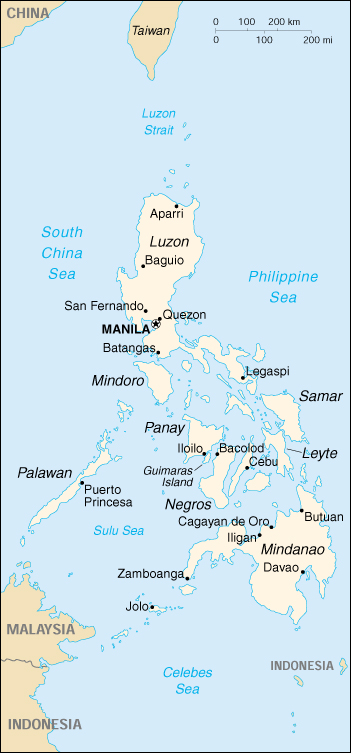

Status Quo Side: Government
Non-Status Quo Side: Huk insurgents
Region: Pacific, East Asia & SE Asia
Conflict Type: Primarily Internal
Issues in Dispute: Governance
The Philippine social and economic system generated substantial peasant disaffection.
The Hukbalahap (Huk) guerrilla group was formed by the Philippine Communist (urban and Soviet-oriented) and Socialist (rural) Parties,originally to fight the Japanese in World War II, and subsequently to build political power. Having destroyed many landlords as well as Japanese, they aroused governmental and US suspicion. At war's end, they assumed control of central Luzon and sought parliamentary strength and redress of grievances enhanced by war-induced dislocations and corruption. After the 1946 election was lost by the Nationalist Party, the regime of President Manuel Roxas Y Acuna denied their seats to Huk leaders of the "Democratic Alliance."
The Huks became Communist-dominated and turned to guerrilla warfare. Despite US materiel assistance to the government, Huk morale and success were high. In March 1948 the Huks were declared illegal. President Elpidio Quirino negotiated an amnesty which the Huk leadership accepted and then denounced. After the reportedly fraudulent elections of 1949, the Huks called for the overthrow of the government. Huk success increased in a period of government corruption until the Army took over from the police in 1950. US pressure for reform plus the promise of land reform and other programs of new Defense Minister Ramon Magsaysay, reduced the threat.
The Huk military leader, Taruc, surrendered.
In the absence of both substantial land reform and elimination of all Huk bands, the threat increased again after the mid-1960's. Subsequently other communist groups pursued occasionally violent opposition tactics, as did a growing Muslim insurgency. President Ferdinand Marcos, reelected in 1969, in 1972 declared martial law, restored law and order, promoted social and economic reforms, and created a political machine that remained dominant after martial law was lifted in 1981, but in the absence of serious reforms a left-wing insurgency grew. Popular anger at excesses by Marcos and his wife Imelda including charges that he had stolen the February 1986 presidential election generated enormous street demonstration s and under US pressure the Marcoses went into exile and Corazon C. Aquino became president. Her Defense minister Fidel Ramos replaced her in May 1992. In 1996 he made an agreement that ended the long-running war between the government and Muslim separatists on the island of Mindanao.